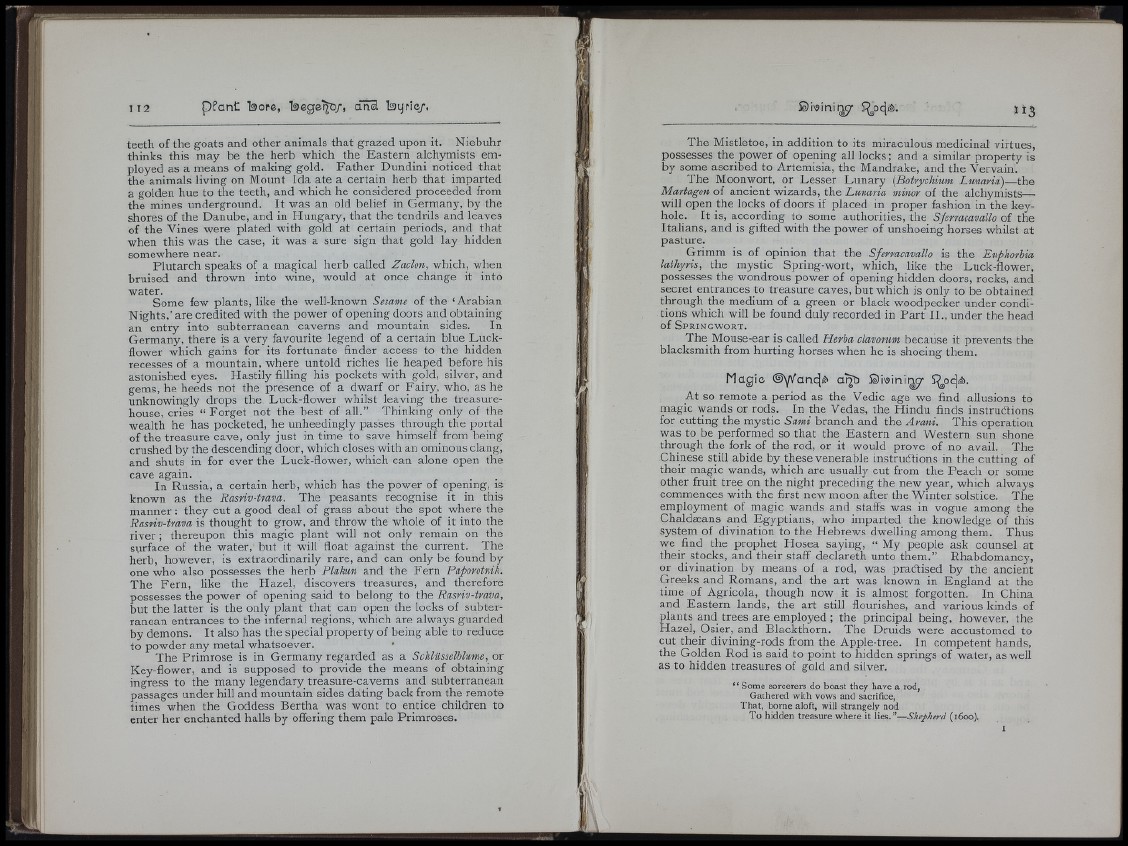
I 12 pFant bore, bege*»^/, cmi. bqric/, 1 1 3
teeth of the goats and other animals that grazed upon it. Niebuhr
thinks this may be the herb which the Eastern alchymists employed
as a means of making gold. Father Dundini noticed that
the animals living on Mount Ida ate a certain herb that imparted
a golden hue to the teeth, and which he considered proceeded from
the mines underground. It was an old belief in Germany, by the
shores of the Danube, and in Hungary, that the tendrils and leaves
of the Vines were plated with gold at certain periods, and that
when this was the case, it was a sure sign that gold lay hidden
somewhere near.
Plutarch speaks of a magical herb called Zaclon, which, when
bruised and thrown into wine, would at once change it into
water.
Some few plants, like the well-known Sesame of the ‘ Arabian
Nights,’ are credited with the power of opening doors and obtaining
an entry into subterranean caverns and mountain sides. In
Germany, there is a very favourite legend of a certain blue Luck-
flower which gains for its fortunate finder access to the hidden
recesses of a mountain, where untold riches lie heaped before his
astonished eyes. Hastily filling his pockets with gold, silver, and
gems, he heeds not the presence of a dwarf or Fairy, who, as he
unknowingly drops the Luck-fiower whilst leaving the treasure-
house, cries “ Forget not the best of all.” Thinking only of the
wealth he has pocketed, he unheedingly passes through the portal
of the treasure cave, only just in time to save himself from being
crushed by the descending door, which closes with an ominous clang,
and shuts in for ever the Luck-flower, which can alone open the
cave again.
In Russia, a certain herb, which has the power of opening, is
known as the Rasriv-trava. The peasants recognise it in this
manner : they cut a good deal of grass about the spot where the
Rasriv-trava is thought to grow, and throw the whole of it into the
r iv e r ; thereupon this magic plant will not only remain on the
surface of the water, but it will float against the current. The
nerb, however, is extraordinarily rare, and can only be found by
one who also possesses the herb Plakun and the Fern Paporotnik.
The Fern, like the Hazel, discovers treasures, and therefore
possesses the power of opening said to belong to the Rasriv-trava,
but the latter is the only plant that can open the locks of subterranean
entrances to the infernal regions, which are always guarded
by demons. It also has the special property of being able to reduce
to powder any metal whatsoever.
The Primrose is in Germany regarded as a Schliisselhlume, or
Key-fiower, and is supposed to provide the means of obtaining
ingress to the many legendary treasure-caverns and subterranean
passages under hill and mountain sides dating back from the remote
times when the Goddess Bertha was wont to entice children to
enter her enchanted halls by offering them pale Primroses.
The Mistletoe, in addition to its miraculous medicinal virtues,
possesses the power of opening all locks; and a similar property is
by some ascribed to Artemisia, the Mandrake, and the Vervain.
The Moonwort, or Lesser Lunary [Botrychium Lunaria)—the
Martagón of ancient wizards, the Lunaria minor of the alchymists—
will open the locks of doors if placed in proper fashion in the keyhole.
It is, accotoing to some authorities, the Sferracavallo of the
Italians, and is gifted with the power of unshoeing horses whilst at
pasture.
Grimm is of opinion that the Sferracavallo is the Euphorbia
lathyris, the mystic Spring-wort, which, like the Luck-flower,
possesses the wondrous power of opening hidden doors, rocks, and
secret entrances to treasure caves, but which is only to be obtained
through the medium of a green or black woodpecker under conditions
which will be found duly recorded in Part II., under the head
o f S p r i n g w o r t .
The Mouse-ear is called Herba clavorum because it prevents the
blacksmith from hurting horses when he is shoeing them.
Magio a'Ji ©l'í)íaii^
At so remote a period as the Vedic age we find allusions to
magic wands or rods. In the Vedas, the Hindu finds instructions
for cutting the mystic Sami branch and the Arani. This operation
was to be performed so that the Eastern and Western sun shone
through the fork of the rod, or it would prove of no avail. The
Chinese still abide by these venerable instruótions in the cutting of
their magic wands, which are usually cut from the Peach or some
other fruit tree on the night preceding the new year, which always
commences with the first new moon after the Winter solstice. The
employment of magic wands and staffs was in vogue among the
Chaldseans and Egyptians, who imparted the knowledge of this
system of divination to the Hebrews dwelling among them. Thus
we find the prophet Hosea saying, “ My people ask counsel at
their stocks, and their staff declareth unto them.” Rhabdomancy,
or divination by means of a rod, was pracitised by the ancient
Greeks and Romans, and the art was known in England at the
time of Agricola, though now it is almost forgotten. In China
and Eastern lands, the art still flourishes, and various kinds of
plants and trees are employed; the principal being, however, the
Hazel, Osier, and Blackthorn. The Druids were accustomed to
cut their divining-rods from the Apple-tree. In competent hands,
the Golden Rod is said to point to hidden springs of water, as well
as to hidden treasures of gold and silver.
“ Some sorcerers do boast they have a rod,
Gathered with vows and sacrifice,
That, borne aloft, will strangely nod
To hidden treasure where it lies.”—Shepherd (1600).